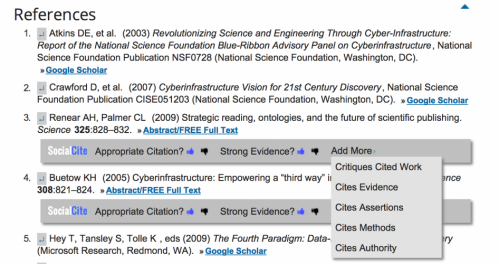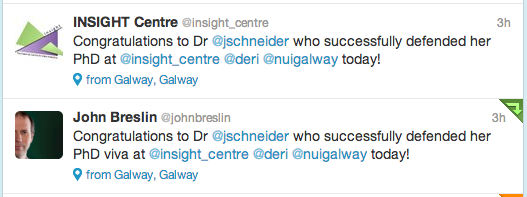Linked Data is big at the 2014 American Library Association meeting! All day Friday & Saturday, plus Sunday morning, you can get your recommended dose of Library Linked Data. See you in Las Vegas?
Friday June 27
I’ll be speaking and moderating a question session in this full-day preconference.
Practical Linked Data with Open Source (separate ticket needed)
Friday, June 27, 2014 – 8:30am to 4:00pm
N258, Las Vegas Convention Center
This pre-conference combines theory and practice by giving participants a working knowledge of the creation and use of linked data and linked data applications. This session will ground participants in linked data models and patterns through hands-on exercises. Participants will go home with a working knowledge of the state of the art of linked data in open source library systems and the use of linked data to solve metadata problems across libraries, archives, and museums
Saturday June 28
I will be speaking about international developments in LLD in Part I:
International Developments in Library Linked Data: Think Globally, Act Globally (Part One)
Saturday, June 28, 2014 – 8:30am to 10:00am
N264, Las Vegas Convention Center
International Developments in Library Linked Data: Think Globally, Act Globally – Part Two
Saturday, June 28, 2014 – 10:30am to 11:30am
S230, Las Vegas Convention Center
Libraries have the potential to make major contributions to the Semantic Web, but are still emerging as global participants. RDA implementation and the BibFrame initiative have drawn fresh attention to the promise and potential of linked data. What are the international developments in linked data, emerging from libraries and other memory institutions? Come hear our speakers address current projects, opportunities and challenges.
Taking action: Linked data for digital collection managers
Saturday, June 28, 2014 – 1:00pm to 2:30pm
S222, Las Vegas Convention Center
The linked data movement has gained momentum. But how does paradigm shift affect digital collection workflows? This workshop will provide key theoretical concepts of linked data and engaging hands-on activities demonstrating how CONTENTdm metadata can be transformed into linked data. The workshop will also provide a forum to discuss how linked data might alter our current practices and workflows. This workshop is geared toward beginners and is designed for curious exploration and active learning.
OCLC The Power of Shared Data: What’s New and What’s Next?
Saturday, June 28, 2014 – 3:00pm to 4:00pm
N116, Las Vegas Convention Center
Join OCLC’s Ted Fons and Richard Wallis to understand how OCLC is leveraging your WorldCat holdings to give your institution broader visibility on the Web. In this session, we will detail current features, planned enhancements and new developments related to linked data.
Sunday June 29
Linked Library Data Interest Group
Sunday, June 29, 2014 – 8:30am to 10:00am
N237, Las Vegas Convention Center
Talk by Jon Phipps & discussion to follow. (Sunday, sadly, I’m on a plane to another meeting.)
Jon Phipps, of Metadata Management, will present a talk on:
RDA and LOD — FTW or WTF? : A Fair and Balanced Point of View.
Is RDA just “the rules” or is it a robust bibliographic metadata model designed specifically to support rich, FRBRized, distributed LOD that just happens to come with several thousand “pages” of rules? What’s this “unconstrained” stuff? Why does RDA RDF have URIs I can’t “read” and will never remember (and what are lexical aliases)? Why are there so many definitions for “Work” anyway? How is RDA handling versioning and releases? How is RDA using Git and GitHub? Why does any of this matter to my data and, more importantly, me?
You’ve got questions? Maybe Jon Phipps has some answers (except for that last one). Jon is a partner in Metadata Management Associates, a consultancy specializing in, wait for it … metadata management, and has been collaborating with various groups of well-intentioned folks trying to define RDA as a data model for what seems like centuries, and thinks that quite recently the JSC has pretty much nailed it.
A question and answer period and a lively managed discussion will follow the presentation. More info & speaker biography.
Understanding Schema.org
Sunday, June 29, 2014 – 10:30am to 11:30am
S230, Las Vegas Convention Center
Jason Clark and Dan Scott
Schema.org is an effort among major search engines to promote better linking of Web content through the use of metadata attributes in HTML markup, allowing for improved access to digital objects. The ALCTS/LITA Metadata Standards Committee invites you to hear speakers who are active in schema.org development in libraries, and who will discuss initiatives in this area within the GLAM community which promote a broader understanding of the development of bibliographic information among these communities.
Kudos to the LITA / ALCTS Linked Library Data Interest Group and ALCTS/LITA Metadata Standards Committee for facilitating a great program!
Above information from the American Library Association and its Linked Library Data Interest Group (updated June 17): double-check room numbers at the conference website, and add sessions to your conference scheduler.

